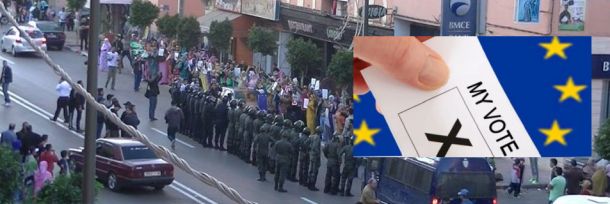
Not awaiting the EU Court of Justice's verdict on the legality of the current fisheries protocol with Morocco over the inclusion of Western Sahara's waters, the EU Commission is already thinking out loud about its successor.
According to a statement issued today by the EU's Fisheries department (DG MARE), the EU Commission is seeking authorization from the EU Member States to commence talks with Rabat for a new fisheries agreement.
The current protocol of the fisheries agreement, established for a period of four years, will expire on July 14, 2018.
But that protocol is at present being scrutinized by the Court of Justice of the European Union. In 2014, the UN-recognised representative of the people of Western Sahara - the Polisario Front - took the deal to Court, seeking its annulment over including Western Sahara. Morocco has occupied three-quarters of Western Sahara, including the coastal strip, since 1975.
On Wednesday, the Court's Advocate-General will present his Opinion on a case questioning the legality of the UK's imports from and fishing in Western Sahara, referred to it by the British Court in October 2015.
Under the current protocol, the EU pays Morocco an annual €30 million: €16 million for access to the waters Morocco considers under its jurisdiction, and €14 million which is earmarked for developing Morocco's fishing industry. Three consecutive annual reports on the geographical spending of that sectoral support have demonstrated that 66.5% was poured into building fisheries infrastructure in occupied Western Sahara. That industry is run by Moroccans, as Saharawis have been socioeconomically relegated to the fringes of a society due to Morocco’s policy of social and economic exclusion of anyone who does not support their colonial project in Western Sahara. Saharawis who find employment, or who have managed to set up some kind of business, have had to pledge their allegiance to the Moroccan king.
In her end-mission statement of her trip to Western Sahara in late 2015, the UN's Special Rapporteur on the right to food Hilal Elver noted that the people of Western Sahara were not equally benefitting from the economic projects that Morocco was undertaking in the territory. Around the same time, the UN's Committee on Economic, Social and Cultural Rights highlighted that poverty continued to affect the Saharawi population disproportionately and that it was not reaping the benefits of the considerable investments being made.
In December 2016, the EU Court of Justice issued a final judgment in the case the Polisario Front had brought against the EU-Morocco agriculture deal. The Court concluded that Western Sahara has a "separate and distinct" status to Morocco, and that as such no EU trade or association agreement could be applied to the territory. In disregard of that clear judgment, the EU Commission is now in talks with Morocco to explore loopholes that will allow for a continuation of the trade flow from the occupied territory.
It is expected that the Member States will endorse the Commission's request to open talks with Morocco in the coming weeks.
According to today's statement, around 120 vessels from 11 EU countries (Spain, Portugal, Italy, France, Germany, Lithuania, Latvia, The Netherlands, Ireland, Poland and United Kingdom) benefit from the fisheries protocol with Morocco.
EU Parliament to hold Western Sahara debates at committee level?
The European Parliament has expressed itself in favour of holding debates in three parliament committees about the exclusion of Western Sahara from EU-Morocco trade agreements.
Here is the EU Council's legal advice on fishing in occupied waters
Hans Corell criticizes EU fisheries in Western Sahara
The former Legal Counsel to the UN Security Counsel, Mr. Hans Corell, comments on the EU's fisheries activities in Western Sahara.
EU elections: how have candidates voted on occupied Western Sahara?
Are you casting your vote for the EU elections? Find here a complete overview of MEP candidates who have supported the Moroccan occupation of Western Sahara in previous controversial votes. Choose wisely.


